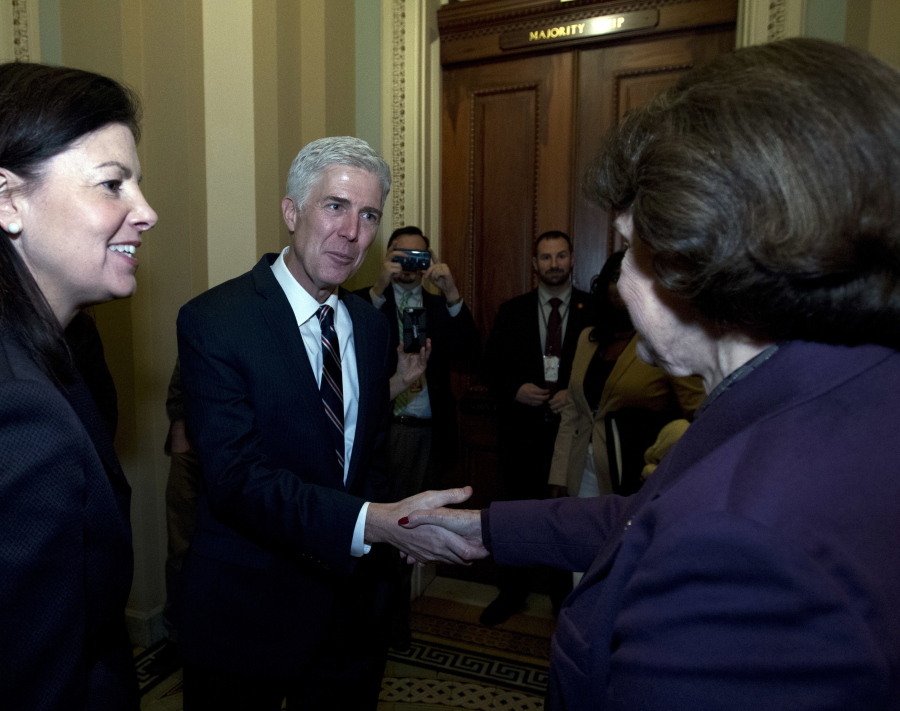WASHINGTON — President Donald Trump urged the Senate’s Republican leader on Wednesday to resort to the “nuclear option” of scrapping long-standing chamber rules if needed to confirm Supreme Court nominee Neil Gorsuch, an aggressive opening to what’s shaping up as a ferocious clash over the future of the high court.
At the White House a day after nominating Gorsuch, Trump endorsed a scenario that would involve majority Republicans unilaterally changing Senate rules over the objections of the Democratic minority.
It could come into play if Democrats try to block Gorsuch’s confirmation with a filibuster, as the liberal base is demanding, and would allow the GOP to confirm Gorsuch with a simple majority instead of the 60 votes now needed.
Addressing GOP Senate leader Mitch McConnell from the White House, Trump said, “If we end up with that gridlock I would say, ‘If you can, Mitch, go nuclear.’ ” He said of Gorsuch that it “would be an absolute shame if a man of this quality was caught up in the web.”
Trump made his comments as Gorsuch traversed Capitol Hill, escorted by Vice President Mike Pence and winning extravagant praise from Republican senators.
Democratic divisions were on display. Minority Leader Chuck Schumer faced intense opposition from base voters to Trump’s nominee, while political risks confronted a half-dozen Democratic senators representing red states who are up for re-election next year and may feel pressure to support Gorsuch.
“The president made an outstanding appointment; we’re all thrilled and looking forward to getting the confirmation process started,” McConnell said as he stood with a smiling Gorsuch in the senator’s ceremonial office in the Capitol.
McConnell has not said whether he might invoke the nuclear option if minority Democrats block Gorsuch’s confirmation, but the Senate leader has said repeatedly that, one way or another, Gorsuch will be confirmed. He reiterated that Wednesday evening in an interview on WHAS radio in Kentucky, saying: “Well I appreciate the president’s advice. What I would say to him is what I would say to you: We’re going to get this nominee confirmed and this is the beginning of a lengthy process.”
Payback may loom
Democrats are still smarting over the treatment of Judge Merrick Garland, former President Barack Obama’s nominee to the court after the death of Justice Antonin Scalia a year ago. McConnell never allowed even a hearing on Garland over 10 months, asserting that the decision was up to the next president.
Now some on the left are demanding payback.
“This is a stolen seat being filled by an illegitimate and extreme nominee, and I will do everything in my power to stand up against this assault on the court,” said Sen. Jeff Merkley of Oregon.
Schumer reiterated Wednesday that Democrats would insist on a 60-vote threshold for Gorsuch in the 100-member Senate, “not because they did it to us or we did it to them, but because 60 votes produces a mainstream candidate.” But as Schumer and other Democrats made clear, for many the fight was less about the mild-mannered 49-year-old appeals court judge than about Trump himself.
Schumer said that “this Supreme Court will be tried in ways that few courts have been tested since the earliest days of the Republic.” Schumer had been invited to meet with Gorsuch on Wednesday but declined so he could learn more about the nominee’s record first.
The rules change for Supreme Court nominees would be a momentous departure for the Senate, which traditionally operates day-to-day via deliberation and bipartisan consent.
There is concern by some that it could begin to unravel Senate traditions at a hyperpartisan moment in politics and perhaps end up in the complete elimination of the filibuster — resulting in an entirely different Senate from the one that’s existed for decades.
Gorsuch is a Denver-based judge on the 10th U.S. Circuit Court of Appeals, the Ivy League-educated son of a former Reagan administration official. His conservative legal philosophy is seen as similar to that of Scalia. Gorsuch would restore the court to the conservative tilt it held with Scalia on the bench, but Trump’s choice “makes it very difficult for Democrats to contest this nomination because he is so qualified,” said Melissa Murray, interim dean of the University of California at Berkeley law school.
Political risks
Republicans were quick to highlight the political risks to Democrats in conservative-leaning states. There are 23 Senate Democrats up for election next year, 10 in states Trump won.
“The minority needs to decide whether or not they want to go to states like North Dakota and Montana and Missouri and Indiana and West Virginia where Mr. Trump won by 17 points or more and talk to the real people there and say ‘we’re going to stop what was clearly your will,’ ” said GOP Sen. Thom Tillis of North Carolina.



